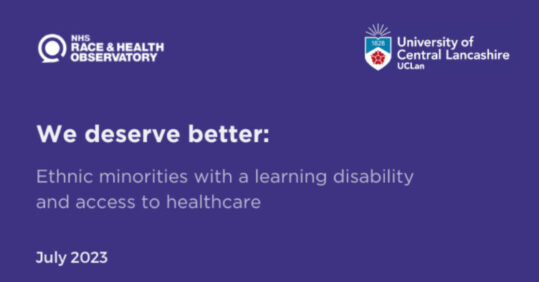ICBs must ensure they have ‘sufficient representative’ learning disability nurses

Integrated care boards (ICBs) must ensure they have ‘sufficient representative’ learning disability nurses to support the diversity of their local populations, according to a new report which identified ‘unjustifiable and avoidable’ disparities in care faced by people with a learning disability from minority ethnic backgrounds.
The report, published by the NHS Race and Health Observatory and supported by NHS England, identified that people with a learning disability from minority ethnic backgrounds have poorer healthcare access, experiences and outcomes, and a shorter life expectancy.
The review draws on data, personal interviews and analyses undertaken by the University of Central Lancashire, in collaboration with Manchester Metropolitan University, Learning Disability England and the Race Equality Foundation.
The average age of death for people with a learning disability who are from a minority ethnic background is 34 years – just over half the life expectancy of their White counterparts, the review highlighted.
Meanwhile, it also noted that the deaths of people from a minority ethnic background are ‘underreported’ to the Learning Disability Mortality Review (LeDeR) programme, which was commissioned by NHS England to improve the standard and care quality for people with a learning disability.
Related Article: Consultation opens on mandatory learning disability and autism training
The report also flagged a lack of reasonable adjustments made within healthcare settings and a failure to recognise individual needs among those with a learning disability from a minority ethnic background.
In addition, the review also warned of other obstacles to care, including: language barriers, cultural and religious insensitivity, a lack of information in easy read format and a lack of information during transitional care in hospital and home.
‘In culmination, these experiences led to some carers fearing for the future for their loved ones,’ the researchers said.
Authors concluded the findings showed that people from minority ethnic backgrounds with a learning disability ‘experience disparities in healthcare’, adding that some participants within the research also experienced discrimination.
And they stressed the need for healthcare providers to ‘tailor support needs and recognise and record accurate, granular ethnicity data’.
As part of the review, a list of recommendations has been put forward to the government, integrated care systems and boards, health leaders and researchers around different policies and actions that must be taken to improve the situation.
This included a call on ICBs to ‘ensure they have sufficient representative learning disability nurses employed within their geography to support the diversity of their local populations’.
And for research to be commissioned to ‘understand the ethnicity and geographical distribution of learning disability liaison nurses compared to the communities they serve’.
In addition, the report suggested the launch of an ‘awareness campaign’ to explain to people with a learning disability and their carers, who are from a minority ethnic background, ‘the value of being on the GP learning disability register and attending yearly health checks’.
Related Article: Learning disability nurses must be ‘in all settings and all areas’, MPs told
It was also recommended that ethnicity data is added to the mandatory data collected as part of the Health and Social Care of People with Learning Disabilities dataset.
Meanwhile, future research on learning disability should aim to investigate differences in health outcomes by ethnicity, researchers added.
Chief executive of the NHS Race Health Observatory Dr Habib Naqvi said that the disparities revealed by this analysis were ‘unjustifiable and avoidable’.
‘For too long, people with a learning disability from an ethnic minority background have received inequitable care and poor outcomes,’ he said.
Dr Naqvi added: ‘A consistent theme from those with lived experience was a lack of information, accessible information, contact and support across GP, community and hospital-based services.’
Meanwhile, Professor Umesh Chauhan, professor of primary care at the University of Central Lancashire said there was a need to ‘highlight better recognition and recording of ethnicity’ to ‘help improve culturally-sensitive and appropriate allocation of healthcare resources’.
Related Article: Bringing the views of student nurses into general practice: Learning disability
A Department of Health and Social Care (DHSC) spokesperson said: ‘No one should experience difficulties in accessing the vital healthcare they need.
‘There has been a lack of data around health outcomes for people from minority ethnic groups in the past, and although this report highlights clear disparities, it makes recommendations that will help us to work towards better outcomes for people from minority ethnic groups with a learning disability.
‘The NHS is already taking actions to address some of the issues in the report and we will look at how best to implement the recommendations for DHSC.’

See how our symptom tool can help you make better sense of patient presentations
Click here to search a symptom

